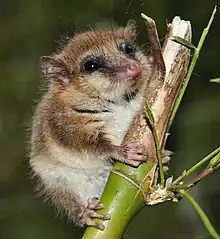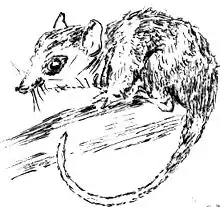Microbiotheria
Microbiotheria are a small order of marsupial mammals with only one living species, the Monito del Monte (Spanish for 'little mountain monkey').
| Microbiotheres Temporal range: Early Palaeocene – Recent | |
|---|---|
 | |
| Scientific classification | |
| Kingdom: | |
| Phylum: | |
| Class: | |
| Infraclass: | |
| Superorder: | |
| Order: | Microbiotheria Ameghino, 1889 |
| Family: | Microbiotheriidae Ameghino, 1887 |
It is the only New World representative of the superorder Australidelphia; all other New World marsupials are part of the Ameridelphia.
The species is nocturnal and arboreal, and lives in thickets of Chilean bamboo in the temperate rain forests of the southern Andes.[1][2] It eats mainly insects and other small invertebrates, supplemented with fruit.[2]
At one time, they were placed in the order Didelphimorphia, the opossums, but due to many morphological differences, they were placed in another order. The skull's shape is strange, with many technical differences from the opossums.
Phylogeny and biogeography

It has long been suspected that South American marsupials were ancestral to those of Australia. The two continents were connected via Antarctica in the early Cainozoic era.
Australia’s earliest known marsupial is Djarthia, a primitive mouse-like animal that lived about 55 million years ago. Djarthia had been identified as the earliest known australidelphian, and this research suggested that the Monito del Monte was the last of a clade which included Djarthia.[2][3]
In 2010, analysis of retrotransposon insertion sites in the nuclear DNA of marsupials confirmed the placement of the Monito del Monte in Australidelphia. It also showed its position as the most basal of that superorder.[4]
The study also confirmed that the most basal of all marsupial orders are the other two South American lineages (Didelphimorphia and Paucituberculata, with the former probably branching first). This indicates that Australidelphia arose in South America (with the ancestors of all other living marsupials), and probably reached Australia in a single dispersal event after Microbiotheria split off (originated).[5][6][7]
References
- Diaz M. & Teta P. (2008). "Dromiciops gliroides". IUCN Red List of Threatened Species. Version 2008. International Union for Conservation of Nature. Retrieved 28 December 2008. Database entry includes justification for why this species is listed as near threatened
- "Monito del monte (Dromiciops gliroides)". EDGE of Existence. Zoological Society of London. 2006. Archived from the original on 2010-09-22. Retrieved 2009-07-05.
- Beck, Robin M.D.; et al. (2008). "Australia's oldest marsupial fossils and their biogeographical implications". PLOS ONE. 3 (3). Public Library of Science: e1858. Bibcode:2008PLoSO...3.1858B. doi:10.1371/journal.pone.0001858. PMC 2267999. PMID 18365013.
- 'Basal': term in cladistics meaning closest to the origin of the clade, or most 'primitive'.
- Schiewe, Jessie (2010). "Australia's marsupials originated in what is now South America, study says". Los Angeles Times. Retrieved 2010-08-01.
- Inman, M. (2010). "Jumping genes reveal kangaroos' origins". PLOS Biology. 8 (7). Public Library of Science: e1000437. doi:10.1371/journal.pbio.1000437. PMC 2910652. PMID 20668663.
- Nilsson, M.A.; et al. (2010). "Tracking marsupial evolution using archaic genomic retroposon insertions". PLOS Biology. 8 (7). Public Library of Science: e1000436. doi:10.1371/journal.pbio.1000436. PMC 2910653. PMID 20668664.